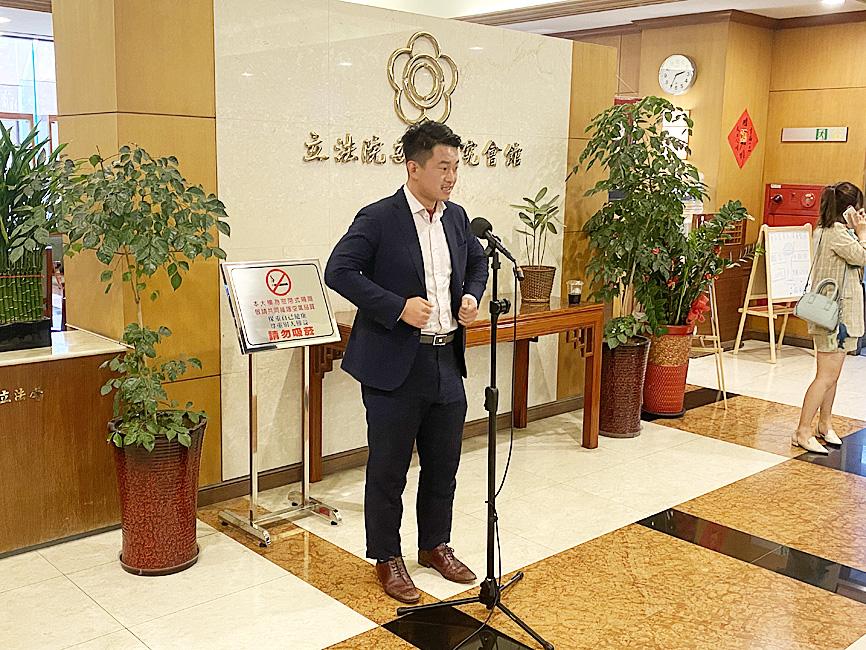The Legislative Yuan yesterday resolved to update the nation’s passport to highlight the Chinese and English for “Taiwan,” and to devise “feasible” ways to rename state-run China Airlines Ltd (CAL, 中華航空) to differentiate it from its Chinese counterpart, Air China.
Motions tendered by Taiwan Statebuilding Party Legislator Chen Po-wei (陳柏惟) and the Democratic Progressive Party (DPP) caucus on the passport cover, and by the DPP and New Power Party caucuses on the name of the airline were voted on yesterday.
The proposals submitted by the DPP caucus won both votes.

Photo: Wu Su-wei, Taipei Times
The first resolution mandates that the English and Chinese for “Taiwan” should be highlighted on the passport to prevent Taiwanese from being confused with Chinese, to uphold their dignity and ensure their safe passage amid the COVID-19 pandemic, which originated in China.
The second resolution says that the international community has often confused China Airlines with Air China and to avoid that, the Ministry of Transportation and Communications should devise ways to set China Airlines planes apart from those of Air China.
China Airlines in the short term should add Taiwanese motifs to the fuselages of its aircraft so that the nation’s air rights would not have to be renegotiated, it says.
The ministry in the long term should devise feasible ways to change the English-language name of China Airlines, it says.
The motions were drafted after reports of Asians being discriminated against overseas due to the COVID-19 pandemic and batches of masks wrapped in banners reading “China Airlines” misleading recipients into thinking that they were donated by China.
The ministry said that it has instructed the China Aviation Development Foundation (中華航空事業發展基金會) — China Airlines’ largest shareholder — to form a consultancy team to discuss the legislature’s resolution.
China Airlines said that it had no comment on the resolution.
Ministry of Foreign Affairs spokeswoman Joanne Ou (歐江安) said in a statement that the foreign ministry would collect feedback on how the nation’s passport should be redesigned.
Additional reporting by Shelley Shan and Lin Chia-nan

CHAOS: Iranians took to the streets playing celebratory music after reports of Khamenei’s death on Saturday, while mourners also gathered in Tehran yesterday Iranian Supreme Leader Ayatollah Ali Khamenei was killed in a major attack on Iran launched by Israel and the US, throwing the future of the Islamic republic into doubt and raising the risk of regional instability. Iranian state television and the state-run IRNA news agency announced the 86-year-old’s death early yesterday. US President Donald Trump said it gave Iranians their “greatest chance” to “take back” their country. The announcements came after a joint US and Israeli aerial bombardment that targeted Iranian military and governmental sites. Trump said the “heavy and pinpoint bombing” would continue through the week or as long

TRUST: The KMT said it respected the US’ timing and considerations, and hoped it would continue to honor its commitments to helping Taiwan bolster its defenses and deterrence US President Donald Trump is delaying a multibillion-dollar arms sale to Taiwan to ensure his visit to Beijing is successful, a New York Times report said. The weapons sales package has stalled in the US Department of State, the report said, citing US officials it did not identify. The White House has told agencies not to push forward ahead of Trump’s meeting with Chinese President Xi Jinping (習近平), it said. The two last month held a phone call to discuss trade and geopolitical flashpoints ahead of the summit. Xi raised the Taiwan issue and urged the US to handle arms sales to

A magnitude 5.6 earthquake struck off the coast of Yilan County at 12:37pm today, with clear shaking felt across much of northern Taiwan. There were no immediate reports of damage. The epicenter of the quake was 16.9km east-southeast of Yilan County Hall offshore at a depth of 66.8km, Central Weather Administration (CWA) data showed. The maximum intensity registered at a 4 in Yilan County’s Nanao Township (南澳) on Taiwan’s seven-tier scale. Other parts of Yilan, as well as certain areas of Hualien County, Taipei, New Taipei City, Taoyuan, Hsinchu County, Taichung and Miaoli County, recorded intensities of 3. Residents of Yilan County and Taipei received

Taiwan has secured another breakthrough in fruit exports, with jujubes, dragon fruit and lychees approved for shipment to the EU, the Ministry of Agriculture said yesterday. The Animal and Plant Health Inspection Agency on Thursday received formal notification of the approval from the EU, the ministry said, adding that the decision was expected to expand Taiwanese fruit producers’ access to high-end European markets. Taiwan exported 126 tonnes of lychees last year, valued at US$1.48 million, with Japan accounting for 102 tonnes. Other export destinations included New Zealand, Hong Kong, the US and Australia, ministry data showed. Jujube exports totaled 103 tonnes, valued at